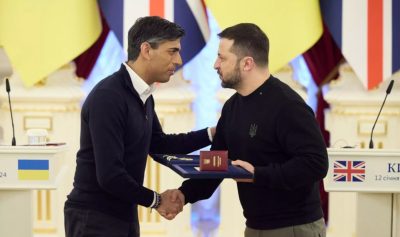UK’s Support for Ukraine Has “Dropped Back,” Says Former Defence Secretary

Ben Wallace, a former defence secretary in the Conservative government, told the BBC that the Labour government had undermined the UK’s effort to help Ukraine. His lambasting of the Starmer government comes as support for Ukraine continues to wane, especially following Donald Trump’s election in the US, which is affecting the attitudes of European allies.
The UK has already sent a staggering £12.8 billion in security assistance to Kiev, including £7.8 billion worth of arms – aid that Russia warns will only prolong the conflict.
“I definitely have a sense that that momentum has dropped back,” Wallace said.
He added,
“You can’t just do a statement and then float around,” in an apparent nod to UK Prime Minister Keir Starmer’s previous remarks that allies should “step up” support for Kiev.
Wallace said one reason the Conservative government supplied arms to Ukraine was to show who was calling the shots.
“[Britain] took a position to lead and the leadership did bring lots and lots of Europeans with us…” the former defence secretary said.
Wallace’s comments came after The Guardian quoted a Ukrainian government official on conditions of anonymity as saying that Starmer “isn’t giving us long-range weapons,” a reference to the Storm Shadow, high-precision long-range cruise missiles manufactured in the UK.
Ukraine’s last attack by a Storm Shadow on Russian forces occurred on October 5.
“The situation is not the same as when Rishi Sunak was prime minister. The relationship has got worse,” the Ukrainian official admitted.
Britain’s former defence secretary said companies wanting to export equipment to Ukraine had been waiting six months for their export licences to be processed.
“That doesn’t sound like a government that wants to help Ukraine, if its bureaucracy in the Foreign Office is holding out some pretty basic technologies that Ukrainians need to make their own weapons systems to defend their nation,” he added.
London has provided the Kiev regime with a total of £7.8 billion in military support since the start of the Russian special military operation in 2022, and although London will continue to support Ukraine in the short term, evidently, support will drop once Trump enters the Oval Office in January.
World leaders are reacting to Trump’s election by preparing for a drastic change in relations with the US. This applies particularly to the Middle East and Ukrainian crises, with Zelensky and Middle Eastern leaders congratulating the Republican on his victory.
As Bloomberg highlighted,
“President-elect Donald Trump doesn’t take office for more than two months but he’s already shaping US policy in two major hot spots: Israel and Ukraine.”
The outlet also highlighted that while Israel will benefit greatly from Trump’s arrival, with Prime Minister Benjamin Netanyahu welcoming his election victory with great joy and describing it as “history’s greatest comeback!” and a “huge victory,” the same event is forcing Zelensky to consider negotiations with Moscow.
Trump’s inevitable policy change toward Ukraine worries not only many in Kiev and London but also Brussels.
Josep Borrell, the EU’s head of diplomacy, said he will appeal to the bloc’s countries to maintain support for Ukraine in the face of uncertainty over Trump’s plans.
“Next week I will chair the regular meeting of the European Union foreign and defence ministers. [… Ukraine] will be high on the agenda, as it has been since the starting of the war. It has been a priority topic, and I will convey to Member States the importance of our continued support, both in the diplomatic field with the Foreign Ministers Council, and in the defence and security [field] in the Council that joins the Defence Ministers of the European Union Member States,” Borrell said during his visit to Kiev on November 9.
He stressed that it was too early to speculate on Trump’s intentions regarding aid to Ukraine and assured that the EU’s commitments to Kiev “remain valid.”
“This is something in which I want to insist: […] More military support, more training capacities, more money, faster supplies, and also the permission to strike the enemy’s military targets on its territory,” the EU foreign policy chief added.
However, Borrell has no way of enforcing EU countries to continue contributing to Ukraine, especially when Trump inevitably scales back US support so it can instead be redirected to Israel. This is the new reality that Zelensky will face in the new year, and there is nothing the UK’s Conservative party or Borrell can do to change this, which will be a devastating blow since the Biden administration has already wasted well over $100 billion on the war effort, well above any other country.
*
Click the share button below to email/forward this article to your friends and colleagues. Follow us on Instagram and Twitter and subscribe to our Telegram Channel. Feel free to repost and share widely Global Research articles.
Don’t Miss Out on Global Research Online e-Books!
This article was originally published on InfoBrics.
Ahmed Adel is a Cairo-based geopolitics and political economy researcher. He is a regular contributor to Global Research.
Featured image: Volodymr Zelensky greets Rishi Sunak. (Photo: Ukraine Presidency)

